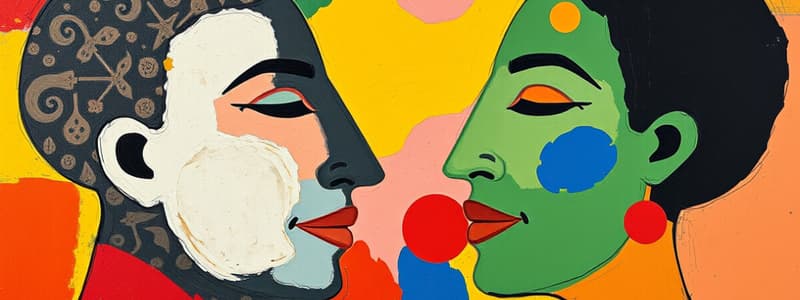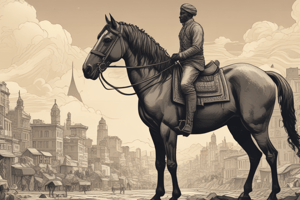Podcast
Questions and Answers
Who is Frantz Fanon?
Who is Frantz Fanon?
Earliest significant theorist of black identity.
What is the mission of underdeveloped countries according to Fanon?
What is the mission of underdeveloped countries according to Fanon?
To resist colonialism and clear the path for new struggles.
What do colonized intellectuals seek in terms of culture?
What do colonized intellectuals seek in terms of culture?
They seek recognition of a national culture and its right to exist.
How does colonialism affect the culture and history of indigenous people?
How does colonialism affect the culture and history of indigenous people?
What is 'double consciousness' as described by Fanon?
What is 'double consciousness' as described by Fanon?
What stages do colonized writers go through according to Fanon?
What stages do colonized writers go through according to Fanon?
What metaphor does Fanon use to describe the cultural state of the colonized after oppression?
What metaphor does Fanon use to describe the cultural state of the colonized after oppression?
What does Fanon refer to when he speaks of national literature?
What does Fanon refer to when he speaks of national literature?
What does Fanon claim is necessary for the existence of culture?
What does Fanon claim is necessary for the existence of culture?
According to Fanon, how is culture perceived by colonial powers?
According to Fanon, how is culture perceived by colonial powers?
What happens to music as national consciousness awakens, according to Fanon?
What happens to music as national consciousness awakens, according to Fanon?
Flashcards
Frantz Fanon's Theory
Frantz Fanon's Theory
Links black identity with existentialism and Marxism, advocating for black revolutions against oppressive white societies.
Reclaiming National Culture
Reclaiming National Culture
The movement by colonized intellectuals to reclaim their national culture while dealing with Western influences.
Colonialism’s Cultural Impact
Colonialism’s Cultural Impact
Colonial powers destroy local cultures, denying historical identity and humanity to exert control.
Negritude
Negritude
Signup and view all the flashcards
Double Consciousness
Double Consciousness
Signup and view all the flashcards
Stages of Literary Development
Stages of Literary Development
Signup and view all the flashcards
Essence of National Culture
Essence of National Culture
Signup and view all the flashcards
Cultural Resistance
Cultural Resistance
Signup and view all the flashcards
Combat Literature
Combat Literature
Signup and view all the flashcards
The Impact of Music
The Impact of Music
Signup and view all the flashcards
Study Notes
Frantz Fanon
- Significant theorist linking black identity with existentialism and Marxism.
- Advocates for the legitimacy of black revolutions against oppressive white societies.
Resistance and Legitimacy
- Underdeveloped nations engage in anti-colonial struggles to assert their legitimacy.
- Colonialist racism denies the Third World legitimacy, sidelining their global presence.
Colonized Intellectuals
- Colonized intellectuals seek recognition of their national culture while grappling with Western cultural influences.
- Reclaiming precolonial culture is seen as vital for restoring national identity, though ultimately deemed unfeasible.
Colonialism’s Impact on Culture
- Colonial powers obliterate indigenous cultures, denying historical identity and humanity.
- This destruction leads to a cultureless state for colonized peoples, amplifying vulnerability to colonial oppression.
Continental vs. National Culture
- Colonized intellectuals strive for a pan-African cultural identity but risk oversimplifying diverse experiences.
- The narrative reduces African identity to a uniform "Negro" culture which marginalizes Arab Africans and others.
Negritude and the Diaspora
- Negritude evolves beyond Africa, connecting the black diaspora, but creates a "dead end" in cultural representation.
- Attempting to unify black culture overlooks the distinct experiences of diverse communities across nations.
Racialization of Culture
- The negritude movement struggles due to cultural definitions shaped primarily in opposition to colonial oppressors.
- Experiences of black Americans differ significantly from those of African leaders, complicating a unified cultural identity.
Double Consciousness
- Lack of a stable national identity leads to individuals feeling rootless and forced into dual identities.
- Colonized individuals define themselves through the lens of colonial cultures, impacting mental health.
Stages of Literary Development
- Colonized writers evolve through stages: assimilating to white culture, attempting to reclaim lost heritage, and finally advocating for their people’s struggles.
- The final stage of writing reflects the true identity of the nation, anchored in the fight against oppression.
Language and Art
- Colonized artists often adopt the language of their oppressors, framing African art within colonial parameters.
- This view leads to exoticism, detracting from authentic representation of culture and maintaining colonial perspectives.
Visual Arts and National Identity
- Colonized artists initially avoid depicting their national reality under colonial rule but seek to represent it upon independence.
- Artistic expressions emerge from the violence and turmoil of newly independent societies.
Poetry and Alienation
- Poetry struggles to reconnect with the present while grappling with a fractured national identity due to colonial histories.
- Encounters with colonial pasts hinder poets from fully capturing the current essence of their people's experiences.
Commitment to National Struggles
- A colonized intellectual's role includes fostering national culture in the context of ongoing liberation efforts.
- The resurgence of national culture springs from collective struggles rather than nostalgic returns to the past.
Distinguishing National Cultures
- No two national cultures within the same colonial system are identical; the push for unifying black culture risks erasure of unique identities.
- Recognizing the individuality of cultures is crucial to prevent homogenization and cultural disappearance.
Oppressor’s Narrative
- Colonial powers strive to establish cultural inferiority in the minds of the oppressed; responses vary from assimilation to cultural defense.
- National culture under colonialism faces systematic destruction, reflecting racism and oppression.
Cultural Resistance
- Any cultural form condemned by colonial rulers embodies resistance and signifies the struggle for nationhood.
- Literary production flourishes as a result of oppression, embodying the national consciousness.
Combat Literature and National Consciousness
- National literature serves as a manifestation of struggle, comparable to combat literature; it evolves alongside shifts in national identity.
- Oral traditions adapt to reflect contemporary experiences and aspirations for national unity.
Impact of Music
- Music mirrors the experiences of the people and evolves in response to historical struggles.
- Jazz exemplifies how cultural expressions can be appropriated and commodified by colonial narratives over time.
Culture as National Expression
- National culture is defined by the collective struggles of its people, not merely a revival of past traditions.
- Postcolonial existence necessitates continuous evolution of culture in alignment with ongoing liberation efforts.
Studying That Suits You
Use AI to generate personalized quizzes and flashcards to suit your learning preferences.



